detail profile sut jhally

Riwayat Hidup
Sut Jhally is Professor of Communication at the University of Massachusetts at Amherst and founder and Executive Director of the Media Education Foundation (MEF).
He is one of the world's leading scholars looking at the role played by advertising and popular culture in the processes of social control and identity construction.
The author of numerous books and articles on media (including The Codes of Advertising and Enlightened Racism) he is also an award-winning teacher (a recipient of the Distinguished Teaching Award at the University of Massachusetts, where the student newspaper has also voted him "Best professor").
In addition, he has been awarded the Distinguished Outreach Award, and was selected to deliver a Distinguished Faculty Lecture in 2007.
He is best known as the producer and director of a number of films and videos (including Dreamworlds: Desire/Sex/Power in Music Video; Tough Guise: Media, Violence and the Crisis of Masculinity; and Hijacking Catastrophe: 9/11, Fear & the Selling of American Empire) that deal with issues ranging from gender, sexuality and race to commercialism, violence and politics.
Born in Kenya, raised in England, and educated in graduate studies in Canada, he currently lives in Northampton, Massachusetts.
Info Pribadi
Peran Yang Di Mainkan Sut Jhally
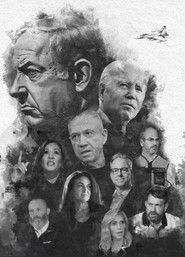 In an exclusive new documentary Max...
In an exclusive new documentary Max...Atrocity Inc. 2024
In an exclusive new documentary, Max Blumenthal rips the cover off the media deceptions and atrocity hoaxes Israel pushed after October 7 to create political space for its gruesome assault on the Gaza Strip. Blumenthal exposes the US mainstream media's role as a megaphone for the Israeli government, introducing new lies even after their initial ones were debunked. Atrocity Inc raises serious questions about the official narrative of October 7, while revealing how Israel's army has consciously engaged in the same hideous atrocities which it falsely accused Palestinian militants of committing.
 Celebrated author and Nation magazine sports...
Celebrated author and Nation magazine sports...Behind the Shield: The Power and Politics of the NFL 2022
Celebrated author and Nation magazine sports editor Dave Zirin tackles the myth that the NFL was somehow free of politics before Colin Kaepernick and other Black NFL players took a knee.
 For years rightwing politicians and pundits...
For years rightwing politicians and pundits...The Man Card 2020
For years, right-wing politicians and pundits have repeatedly criticized the left for playing “the race card” and “the woman card.” This new film turns the tables and takes dead aim at the right’s own longstanding – but rarely discussed – deployment of white-male identity politics in American presidential elections. Ranging from Richard Nixon’s tough-talking, law-and-order campaign in 1968 to Donald Trump’s hyper-macho revival of the same fear-based appeals in 2020, "The Man Card" shows how the right has mobilized dominant ideas about manhood and enacted a deliberate strategy to frame Democrats and liberals as soft, brand the Republican Party as the party of “real men,” and position conservatives as defenders of white male power and authority in the face of transformative demographic change and ongoing struggles for racial, gender, and sexual equality.
 In this era of Facebook privacy...
In this era of Facebook privacy...Digital Disconnect 2018
In this era of Facebook privacy breaches, "fake news" and filter bubbles, this essential film trains its sights on the relationship between the internet and democracy. Tracing the internet's history as a publicly funded government project in the 1960s to its full-scale commercialization today, the film traces how the revolutionary, democratizing potential of the internet has been radically compromised by the growing and unaccountable power of a handful of telecom and tech monopolies.
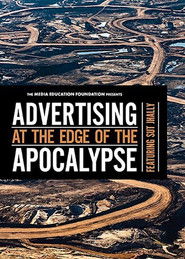 In this highly anticipated sequel to...
In this highly anticipated sequel to...Advertising at the Edge of the Apocalypse 2018
In this highly anticipated sequel to his groundbreaking, ADVERTISING AND THE END OF THE WORLD, media scholar Sut Jhally explores the devastating personal and environmental fallout from advertising, commercial culture, and rampant American consumerism. Ranging from the emergence of the modern advertising industry in the early 20th century to the full-scale commercialization of the culture today, Jhally identifies one consistent message running throughout all of advertising: the idea that corporate brands and consumer goods are the keys to human happiness. He then shows how this powerful narrative, backed by billions of dollars a year and propagated by the best creative minds, has blinded us to the catastrophic costs of ever-accelerating rates of consumption.
 Deepa Kumar a leading scholar on...
Deepa Kumar a leading scholar on...Constructing the Terrorist Threat: Islamophobia, The Media & The War on Terror 2017
Deepa Kumar, a leading scholar on Islamophobia, argues that U.S. media have turned Arabs and Muslims into the new face of terror, even though only a tiny fraction of Muslims and Arabs have ever committed a terror attack, and terror attacks by homegrown right-wing violent extremist groups have far outnumbered attacks by Muslims and Arabs since Sept. 12, 2001.
 Over the past few years Israels...
Over the past few years Israels...The Occupation of the American Mind 2016
Over the past few years, Israel's ongoing military occupation of Palestinian territory and repeated invasions of the Gaza strip have triggered a fierce backlash against Israeli policies virtually everywhere in the world—except the United States. This documentary takes an eye-opening look at this critical exception, zeroing in on pro-Israel public relations efforts within the U.S.
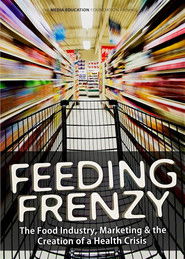 In the past three decades obesity...
In the past three decades obesity...Feeding Frenzy: The Food Industry, Obesity and the Creation of a Health Crisis 2013
In the past three decades, obesity rates in the US have more than doubled for children and tripled for adolescents, and 70% of adults are now obese or overweight. The result has been a widening epidemic of obesity-related health problems, including coronary heart disease, high blood pressure, stroke, and Type 2 diabetes. While discussions about this spiraling health crisis have tended to focus on the need for more exercise and individual responsibility, FEEDING FRENZY trains its focus squarely on the responsibility of the processed food industry and the outmoded government policies it benefits from. It lays bare how taxpayer subsidies designed to feed hungry Americans during the Great Depression have enabled the food industry to flood the market with a rising tide of cheap, addictive, high calorie food products, and offers an engrossing look at the tactics of the multi billion-dollar marketing machine charged with making sure that every one of those surplus calories is consumed.
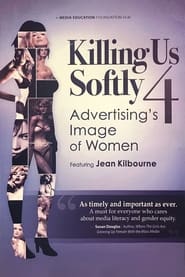 The documentary focuses on images of...
The documentary focuses on images of...Killing Us Softly 4: Advertising's Image Of Women 2010
The documentary focuses on images of women in advertising, in particular on gender stereotypes, the effects of advertising on women's self-image and the objectification of women's bodies.
 With breathtaking clarity renowned University of...
With breathtaking clarity renowned University of...Capitalism Hits the Fan 2009
With breathtaking clarity, renowned University of Massachusetts Economics Professor Richard Wolff breaks down the root causes of today's economic crisis, showing how it was decades in the making and in fact reflects seismic failures within the structures of American-style capitalism itself. Wolff traces the source of the economic crisis to the 1970s, when wages began to stagnate and American workers were forced into a dysfunctional spiral of borrowing and debt that ultimately exploded in the mortgage meltdown. By placing the crisis within this larger historical and systemic frame, Wolff argues convincingly that the proposed government "bailouts," stimulus packages, and calls for increased market regulation will not be enough to address the real causes of the crisis, in the end suggesting that far more fundamental change will be necessary to avoid future catastrophes.
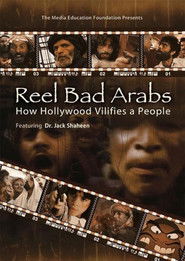 This documentary dissects a slanderous aspect...
This documentary dissects a slanderous aspect...Reel Bad Arabs: How Hollywood Vilifies a People 2006
This documentary dissects a slanderous aspect of cinematic history that has run virtually unchallenged form the earliest days of silent film to today's biggest Hollywood blockbusters. The film explores a long line of degrading images of Arabs--from Bedouin bandits and submissive maidens to sinister sheikhs and gun-wielding "terrorists"--along the way offering devastating insights into the origin of these stereotypic images, their development at key points in US history, and why they matter so much today.
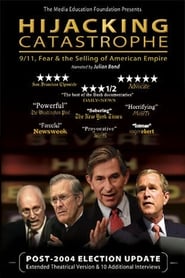 This documentary places the Bush Administrations...
This documentary places the Bush Administrations...Hijacking Catastrophe: 9/11, Fear & the Selling of American Empire 2004
This documentary places the Bush Administration's original justifications for war in Iraq within the larger context of a two-decade struggle by neo-conservatives to dramatically increase military spending while projecting American power and influence globally by means of force.
 Theres a bad mood rising against...
Theres a bad mood rising against...No Logo 2003
There's a bad mood rising against the corporate brands. No Logo is the warning on the label. In the last decade, No Logo has become a cultural manifesto for the critics of unfettered capitalism worldwide. As the world faces a second economic depression, No Logo's analysis of our corporate and branded world is as timely and powerful as ever. Equal parts cultural analysis, political manifesto, mall-rat memoir, and journalistic exposé, No Logo is the first book to put the new resistance into pop-historical and clear economic perspective. It tells a story of rebellion and self-determination in the face of our new branded world.
 It has been 30 years since Title...
It has been 30 years since Title...Playing Unfair 2002
It has been 30 years since Title IX legislation granted women equal playing time, but the male-dominated world of sports journalism has yet to catch up with the law. Coverage of women's sport lags far behind men's, and focuses on female athletes' femininity and sexuality over their achievements on the court and field. While female athleticism challenges gender norms, women athletes continue to be depicted in traditional roles that reaffirm their femininity - as wives and mothers or sex objects. By comparison, male athletes are framed according to heroic masculine ideals that honor courage, strength, and endurance.
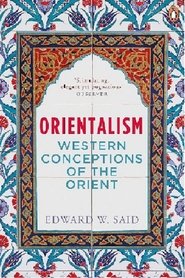 Edward Saids book Orientalism has been...
Edward Saids book Orientalism has been...Edward Said On Orientalism: "The Orient" Represented in Mass Media 1998
Edward Said's book Orientalism has been profoundly influential in a diverse range of disciplines since its publication in 1978. In this engaging and lavishly illustrated interview he talks about the context within which the book was conceived, its main themes, and how its original thesis relates to the contemporary understanding of "the Orient" as represented in the mass media. "That's the power of the discourse of Orientalism. If you're thinking about people and Islam, and about that part of the world, those are the words you constantly have to use. To think past it, to go beyond it, not to use it, is virtually impossible, because there is no knowledge that isn't codified in this way about that part of the world." -Edward Said
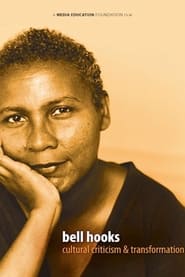 bell hooks is one of Americas...
bell hooks is one of Americas...bell hooks: Cultural Criticism & Transformation 1997
bell hooks is one of America's most accessible public intellectuals. In this two-part video, extensively illustrated with many of the images under analysis, she makes a compelling argument for the transformative power of cultural criticism.
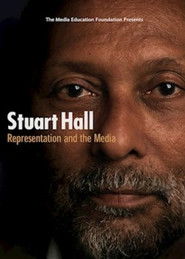 Cultural theorist Stuart Hall offers an...
Cultural theorist Stuart Hall offers an...Stuart Hall: Representation & the Media 1997
Cultural theorist Stuart Hall offers an extended meditation on representation. Moving beyond the accuracy or inaccuracy of specific representations, Hall argues that the process of representation itself constitutes the very world it aims to represent, and explores how the shared language of a culture, its signs and images, provides a conceptual roadmap that gives meaning to the world rather than simply reflecting it. Hall's concern throughout is the centrality of culture to the shaping of our collective perceptions, and how the dynamics of media representation reproduce forms of symbolic power.
